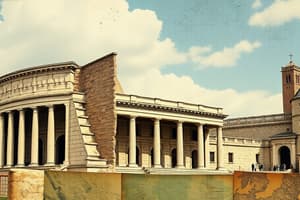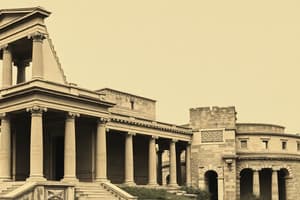Podcast
Questions and Answers
What is the Temple of Minerva and Sculpture of Apollo?
What is the Temple of Minerva and Sculpture of Apollo?
Image
What materials were used to create the Temple?
What materials were used to create the Temple?
Wood, mud brick, volcanic rock (tufa)
Who created the Temple and Statue of Apollo?
Who created the Temple and Statue of Apollo?
Vulca
What is the Temple's building structure?
What is the Temple's building structure?
What was the purpose of the temple?
What was the purpose of the temple?
How did people access the temple?
How did people access the temple?
What is the Apollo statue made of?
What is the Apollo statue made of?
What kind of smile does the Apollo statue have?
What kind of smile does the Apollo statue have?
Other figures found near Apollo suggest an audience watching the action.
Other figures found near Apollo suggest an audience watching the action.
How many cellas were there in the temple, and who were they dedicated to?
How many cellas were there in the temple, and who were they dedicated to?
The sculpture of Apollo has arms and hands.
The sculpture of Apollo has arms and hands.
What was the roof of the temple made from?
What was the roof of the temple made from?
Flashcards are hidden until you start studying
Study Notes
Temple of Minerva
- Location: Veii, near Rome, Italy; constructed between 510-500 B.C.E.
- Built from wood, mud brick, and tufa (volcanic rock); features wooden columns and sundried mud brick walls.
- Architectural style includes a post and lintel structure with a tile-covered timber roof.
- Entrance accessible via a narrow staircase at the center front, elevated on a stone podium.
- Dedicated to the Etruscan goddess Minerva (Greek equivalent: Athena); serves as a place of worship for Etruscan deities.
- Typically designed with a 6:5 temple ratio and includes three cellas for Minerva, Trinia (Zeus/Jupiter), and Uni (Hera/Juno).
Sculpture of Apollo
- Made of terra cotta; exhibits an animated and lively appearance indicative of Etruscan artistic style.
- Larger-than-life size with an Archaic Greek smile; likely a central figure in rooftop narratives.
- Created by master sculptor Vulca, who was renowned in Etruscan sculpture.
- Other figures found nearby, such as Hercules and Artemis's golden deer, suggest an audience observing the action.
Structural and Artistic Features
- Temple's roof: tiled and timber; walls constructed from sundried mud brick.
- Apollo statue lacks arms/hands, a notable detail in its present condition.
- Sculptural details point to storytelling elements typical in Etruscan temples, enhancing overall narrative and worship significance.
Studying That Suits You
Use AI to generate personalized quizzes and flashcards to suit your learning preferences.




